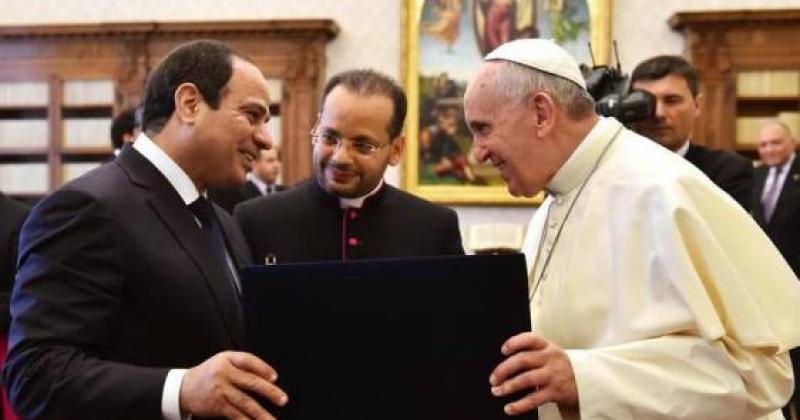The Catholic Church “stands by the side of all the people of Egypt during the period of political transition.” Pope Francis assured Egypt’s President Abdel Fattah Sisi of this in an audience held in the Vatican on Monday, Novermber 24, six years after Benedict XVI’s meeting with Hosni Mubarak.
He came to Rome as part of a brief European visit which will take him to France. The President’s conversation with the Pope first and then with the Vatican Secretary of State, Cardinal Pietro Parolin were “cordial” and subjects touched on “guarantees” offered by the new constitution in the field of religious freedom, the need to “strengthen peaceful co-existence between all parts of society” and the importance “of dialogue and negotiation” as the “only option” left for the conflict-ridden Middle East.
“During the course of the cordial conversations, [Francis] focused on the situation in the country, underlining the support and solidarity of the Church toward the entire Egyptian population during the period of political transition. [The Pope] also expressed the hope that the guarantees offered by the new Constitution in the field of human rights and religious freedom would include the reinforcement of peaceful co-existence between all parts of society, continuing the path of interreligious dialogue. Next, some issues of common interest were discussed, especially the role of the country in the promotion and stability of the Middle East and North Africa. Dialogue and negotiation are the only ways to put an end to the conflicts and violence that are putting defenceless populations in danger and causing loss of human life,” the Vatican statement went on to say.
The audience lasted 22 minutes. The Egyptian president arrived at the Apostolic Palace, not at St. Martha’s House, in the early afternoon and entered the Pope’s library at 14:34. As far as the journalists present were able to hear before the doors to the study closed for the private meeting, the President spoke about Egypt’s peace efforts and said he was “very happy” he had the opportunity to meet such “a great figure” as the Pope who “is so important for the whole of humanity.” There was an interpreter present to assist with the translation. Sisi, who was all smiles and appeared almost embarrassed, introduced the Pope to the new top figures – all male – that formed part of his entourage and presented the Pope with an inlaid silver box. There was tight security around the Vatican on the occasion of the President’s visit.
Abdel Fattah Sisi came to power on 8 June last year. On that very same day, Palestine’s President Mahmoud Abbas (Abu Mazen) attended Sisi’s inauguration ceremony in Cairo, before heading to the Vatican for the prayer meeting Francis organised with him and Israel’s President Shimon Peres. As Defence Minister since August 2012, Sisi played a key role in the coup which overthrew the then President Mohammed Morsi – a representative of the Muslim Brotherhood who is now in prison – on 3 July, following mass protests. He then organised the bloody suppression of the Islamic Movement. Sisi then cast aside his military uniform to run for the presidency against the only other candidate, labour activist Hamdeen Sabahi. Al Sisi won more that 90% of the vote in a three-day election which had a less than 50% turnout.
Balance in the Maghreb region and the Middle East depends greatly on Egypt. In these regioSisi has shown a great deal of attention to the local Christian community, particularly the Coptic Church (Pope Tawadros II, who was received by the Roman Catholic Pope in May 2013, defined Sisi as a “hero” who “saved Egypt”). Article 64 of the new Constitution, which was approved this year, guarantees religious freedom. Parliament is going to discuss a law that should reduce restrictions on the building of churches. In recent days, the transitional ministry of justice asked Egypt’s Christian churches to help fine tune a new bill on the personal status of Christians and other religious minorities, Fides news agency reports.
The last time an Egyptian president was received by the Pope was eight years ago. Benedict XVI received Hosni Mubarak in the Vatican at the start of his pontificate on 13 March 2006. Then relations between Egypt and the Holy See became complicated over the years. Relations cooled after the Arab Spring revolts and the fall of the Mubarak government on the one hand and some declarations Benedict XVI made in defence of Coptic Christians who were attacked in 2010 which Cairo considered an interference in domestic affairs. Sunni Al-Azhar University reacted particularly strongly, suspending relations with the Holy See. The university’s great Imam, Ahmed Al-Tayeb, is now organising an international conference to “counter extremist discourse”. The meeting is scheduled to take place at the start of December. Before Sisi’s election, when Adly Mansour was filling in as Egypt’s interim President, the then Minister of Foreign Affairs, Nabil Fahmy, met Francis in the Vatican.
